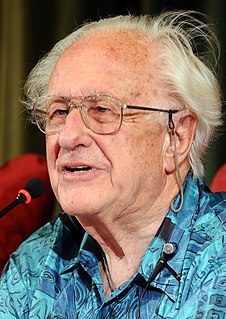A Quote by Oliver Sacks
Studies by Andrew Newberg and others have shown that long-term practice of meditation produces significant alterations in cerebral blood flow in parts of the brain related to attention, emotion, and some autonomic functions.
Related Quotes
The future of human relationships will be directly related to the cerebral functions. For this reason it is already a fundamental thing. In the past, and well until today, some South American countries have had a great neuropharmacological history, since the natives' times. It is necessary that we remind ourselves of the many licit and illicit drugs that were generated in our continent and that act on the brain.
Meditators are shown to have thickening in parts of the brain structure that deal with attention, memory and sensory functions. This was found to be more noticeable in older, more practiced meditators than in younger adults which is interesting because this structure usually tends to get thinner as we age.
There have been studies done on people who meditate and they have found that they actually have increased grey matter in certain parts of their brain and more neural conductivity, meaning more connections between certain parts of the brain. They have increased capacity for, in some cases, memory, or reasoning.
Science is now documenting that it's not the objects of meditation that are important, it's the process of paying attention to them - the attending - that actually influences the organism in a whole range of different ways. The brain changes significantly enough to impact thought, emotion, and other biological functions. Today, people recognize that they're not going to find well-being from the outside, or from a pill; they're going to find it by looking inside. All the suffering, stress, and addiction comes from not realizing you already are what you are looking for.
So, you can define emotions very simply as the process of perceiving what is going on in the organs when you are in the throws of an emotion, and that is achieved by a collection of structures, some of which are in the brain stem, and some of which are in the cerebral cortex, namely the insular cortex, which I like to mention not because I think it's the most important, it's not.
We are part of nature, a product of a long evolutionary journey. To some degree, we carry the ancient oceans in our blood. … Our brains and nervous systems did not suddenly spring into existence without long antecedents in natural history. That which we most prize as integral to our humanity - our extraordinary capacity to think on complex conceptual levels - can be traced back to the nerve network of primitive invertebrates, the ganglia of a mollusk, the spinal cord of a fish, the brain of an amphibian, and the cerebral cortex of a primate.





































